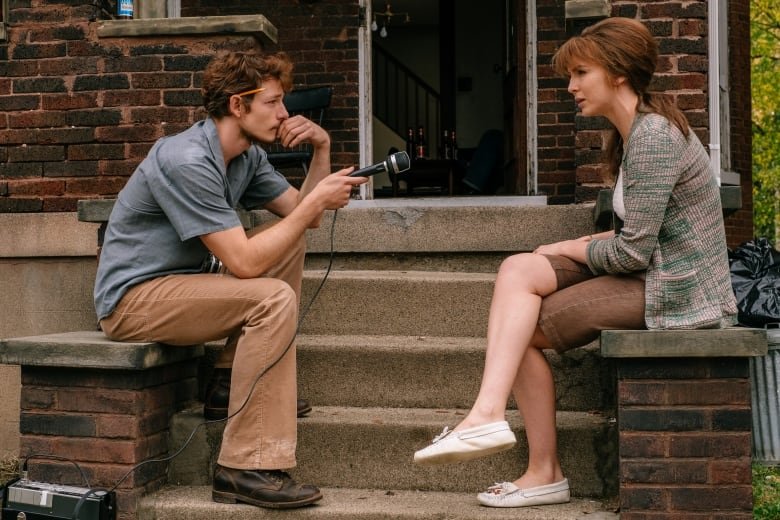[ad_1]
When Leonardo DiCaprio was promoting The Wolf of Wall Street, Martin Scorsese’s debauchery-filled story of insider trading, unflagging self-interest and corruption, the actor was forced to shadowbox against a seeming tidal wave of young people he saw as misinterpreting the critique against greed as an endorsement of it.
He was fighting a group so wrapped up in and impressed by their own overemphasized qualities on screen, they didn’t see them as grotesque. They saw them as approval.
So after the film’s premiere, he reportedly asked a nearby young fan: “They know it’s a cautionary tale, right?”
Enter The Bikeriders: the new hyper-masculine, motorcycle-gang movie with a title so contradictorily tepid it would be funny — if it wasn’t so pointed.
The Bikeriders exists in a special club of films that exploit a subculture’s wildest dreams to showcase their absurdity: everything from The Wolf of Wall Street to Whiplash, American Psycho to Fight Club, Wall Street to Watchmen‘s criminally misinterpreted Rorschach.
It’s something of a takedown of the very same American Dream archetypes it spends nearly two hours ostensibly visually worshiping on screen.
WATCH | The Bikeriders trailer:
And given those past trends, this tension could very easily foul up director Jeff Nichols’s attempts to get at the movie’s theme: challenging the self-destructive impulses of manhood.
Worst-case scenario is that the movie would prompt dads and boyfriends around the world to wonder, wide-eyed, whether they have enough dusty tools and garage space to put together a chopper of their own.
But here, The Bikeriders has pulled something of a magic trick: its dreamy and loose story, rotating cast of characters and obvious philosophizing is less Wild Hogs bro-comedy and more Zen and the Art of Motorcycle Maintenance from the get go. Its structure — a somewhat aimless recounting of the purposefully purposeless actions of a midwestern motorcycle club — allows for a self-analytical grappling with the fruitlessness of its characters’ actions.
Loosely adapted
The Bikeriders is (very) loosely based on Danny Lyon’s 1968 book of the same name featuring photography and transcribed interviews with a local group of motorcyclists — and containing roughly only 40 pages of actual written text for Nichols to build out.
The connection between the original and the adaption is tenuous enough that Lyon’s real biker gang (the Outlaws) becomes the fictional Vandals, the time period gets pushed from early 1960s to 1965-1973 and the film begins with text stating simply “a journalist” wrote the book upon which it’s based.
That nameless journalist does show up in the film: a slightly wilder-haired Mike Faist sticking a microphone in the face of characters who wax poetic about the unwarranted persecution, and heroic freedom, of the motorcyclist — then slash someone’s face, burn down a bar or drive that motorcycle really fast away from the cops.
And Nichols does use Lyon’s work here — many of the characters’ interviews (from Cockroach’s argument for eating bugs, to Cal’s story of a 300-pound mechanic to Zipco being barred from joining the Vietnam war effort due to a “schizophrenic personality”) come almost verbatim from the book.
Pathetic heroes
At the core are three specific voices: club president Johnny (Tom Hardy), loner Benny (Austin Butler) and his unfortunate love interest, Kathy (Jodie Comer).
However, there’s little in the way of direct or engaging plot. Instead, we more-or-less randomly knock around between these characters in a collaged facsimile of Easy Rider‘s sense of untethered liberty, Rebel Without a Cause‘s self-righteous fight against the strictures of society or even the early naivete and hedonism in Hunter S. Thompson’s similarly written Hell’s Angels — stories that present the mythic legend of the biker with more grandeur.
But here, the grandeur is decidedly not larger than life. Johnny is simultaneously the archetypal square-jawed leader deified by the younger Vandals, and a semi-pathetic, aging truck driver less in control of the gang than he is trapped by the expectations and perception his group has of him.
Benny, who in any other story would be the tragic hero, just comes across as misguided. And instead of seeing his devil-may-care freedom (and well coiffed hair) exalted, the cursory and almost clinical documentary style showcases it for what it really is: sad and destructive.
The heart of The Bikeriders, however, isn’t a rider at all. Kathy, who at one point — stuck in a home littered with empty beer bottles and gang members — complains she used to be “respectable,” fleshes out the film. Both disgusted by and enamoured with the group, she acts as a sort of stand-in for Nichols and his audience: unable to understand the bikers’ behaviour, but unwilling to escape it, both she and we are left to question how masculinity can be so ridiculous but, occasionally, also strangely beautiful.
And as the group descends further into violence, tipping from outlaw freedom into organized criminality, sexual assault and general brutality, there film probes into the draw of radicalism. Detailing the ’60s counterculture — followed by its waning in the early ’70s — is interesting, but ultimately difficult to pull off in a film that drifts around so much without having your audience feel just a little bit bored.
So if The Bikeriders falls a bit impenetrably short in coming up with answers to its questions, that’s part of the game as well. Because instead of trying to attack a perceived evil, Nichols is more concerned with observing it. Over its 156-minute runtime, The Bikeriders examines its characters and the counterintuitive iconography of manhood like poorly made, but deeply interesting little tchotchkes — before hurling them at a wall to see what they look like when they inevitably break.
It’s not perfect, but The Bikeriders‘ mix of love, disdain and disinterest for its subject is interesting. And if nothing else, it at least may be the only film of its type too inscrutable for its targets to misinterpret.
[ad_2]
